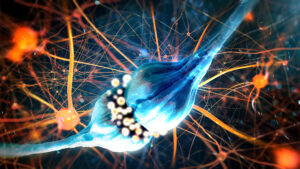
Myths of mental illnesses – Let’s break them down

DR ARUNA
Holistic Psychiatrist

Myth 1: Mental illness is from a chemical imbalance in the brain. This is the most common myth peddled about cause of mental illnesses, likely perpetuated by BigPharma.
Fact 1: Mental illness is a breakdown in the larger physiological functioning within a person. In other words it is a breakdown in the “hardware” of the body aka the mind-body-spirit system that manifests in the “software” of our systems as mental illnesses.

Myth 2: Mental illness is lifelong.
Fact 2: This is a blatant falsehood if you follow root cause resolution treatments as offered at Trinergy. Just ask our patients! (https://trinergyhealth.com/client-testimonials/).
This above statement could be true if you are receiving traditional care in the “sick care system” aka our mainstream health care system.
Myth 3: Mental illness cannot be cured, just managed with medications and therapy

Fact 3: see fact 2 above 😊.

Myth 4: Psychiatric medications are lifesavers.
Fact 4: They are as much of a lifesaver as a bandaid is over a fracture! Or for that matter an antacid medication is for acid reflux!! Yep, this can be a post in itself 😊. Regarding psych meds, yes, there can be symptomatic improvement in the short term but they invariably cause further deterioration in the root causes which are never addressed. In addition most psychiatric medications cause dependence that is very hard to overcome without holistic treatment. Long term studies, which are typically not funded by industry, whether it be for depression, schizophrenia or ADHD have consistently shown short term gains but long term harms including more severe episodes and most risk for permanent disability.

Myth 5: Antidepressants are safe and do not increase risk of suicide or self-harm.
Fact 5: Another blatant falsehood. Antidepressants are neither safe nor effective. Population based studies have repeatedly shown that they carry risk of impulsivity especially when rapid dose changes, titrations, withdrawals, or switching from one med to another is attempted. Patients can experience severe forms of adverse reactions like akathisia which can lead to suicidality, homicidality and such. Here’s a link to my substack article on this subject:

Myth 6: Psychiatric meds like antidepressants do not cause dependence. You can come off of them when you are ready.
Fact 6: I give this Pinocchio rating #10. All psychiatric meds used currently (antidepressants, antipsychotics, benzodiazepines, stimulants, etc) cause dependence at the nervous system level. Majority of people are unable to come off of these meds even when they become well. For a long time, Big Pharma blamed the withdrawal symptoms on the patients as “discontinuation syndrome” and urged doctors and patients to never stop taking these meds (a perfect revenue generation model, eh?). But journalists like Robert Whitaker (Anatomy of an epidemic) and physician researchers like Dr David Healy, Dr Peter Breggin, Dr Peter Gotzsche, Dr Joanna Moncrieff and yours truly have raised the alarm about this serious issue and tried to educate the public. At Trinergy, we know how to safely help patients come off of medications that they do not need or that are causing them harm.

Myth 7: Psychiatric medications are safe to use in children.
Fact 7: There are no long term studies that have looked at effects of psychiatric meds on the developing brains of children. What we see is the same scenario as in adults. Psychiatric meds to not help and carry risk of significant harm.

Myth 8: We have made many advances in the field of neuro-science and mental illness is still a mystery.
Fact 8: It is mystery because we are barking up the wrong tree- mental illness is not just a disease of the brain. It is a disease of the whole mind-body-spirit system. When we address the root causes in the gut brain axis, in the immune system, in the hormonal system, and such, we can offer meaningful pathway towards recovery. I repeat, causes of mental illnesses or for that matter, any illness is not a mystery. As I have explained in my soon to be published book, the three main root causes are: bad diet, trauma or stress in life and toxins in our environment.

Myth 9: Antidepressants are relatively safe during pregnancy. At the very least, it is better for mom and infant to be on an antidepressant than be depressed.
Fact 9: Studies have consistently shown that antidepressant exposure during pregnancy affects the neurodevelopmental trajectory of the developing baby and has been linked to a diagnosis of conditions like autism, adhd, anxiety, depression, etc by the time the child is 8 years old. Paternal use of antidepressants around the time of conception is also linked to autism in the offspring.

Myth 10: Mental illness is genetic. Environment plays a minor role. And besides gene therapy which is in its infancy, nothing much can be done.
Fact 10: If environment is not to blame, how come we are seeing a tremendous increase in rates of all mental illnesses over the last few decades. Do genes change so quickly, within a matter of decades? No they do not. In fact, gene defects account only for a small percentage of mental illnesses like autism, schizophrenia, bipolar, major depression, etc. Even here is the epigenetic effect – which is the complex interplay between environment and genes that decides how, when and what genes are expressed. We are in constant “play” or “dance” with our environment. When genes are involved, the main genetic mechanism involves a group of genes known as methylation genes – MTHFR is the main one amongst them. Even here, the expression of these genes can be changed for the better with targeted nutritional supplements. This is one of the main interventions at Trinergy.
Myth 11: Modern science has progressed so much in the field of mental health and we have transformed patient experience for the better.
Fact 11: hmm…then, why is that cross-country studies consistently show that more mental illness and higher rates of worse outcomes like suicide are seen in countries where there is high availability of psychiatrists, therapists and mental health care systems???
References:
- Burgess P, Pirkis J, Jolley D, Whiteford H, Saxena S. Do nations’ mental health policies, programs and legislation influence their suicide rates? An ecological study of 100 countries. Aust N Z J Psychiatry. 2004 Nov-Dec;38(11-12):933-9. doi: 10.1080/j.1440-1614.2004.01484.x. PMID: 15555028. https://pubmed.ncbi.nlm.nih.gov/15555028/
Chaste, P., & Leboyer, M. (2012). Autism risk factors: genes, environment, and gene-environment interactions. Dialogues in clinical neuroscience, 14(3), 281–292. https://doi.org/10.31887/DCNS.2012.14.3/pchaste
Cohen D, Recalt A. Withdrawal effects confounding in clinical trials: another sign of a needed paradigm shift in psychopharmacology research. Ther Adv Psychopharmacol. 2020 Nov 6;10:2045125320964097. doi: 10.1177/2045125320964097. PMID: 33224467; PMCID: PMC7656873.
Cosci F, Chouinard G. Acute and Persistent Withdrawal Syndromes Following Discontinuation of Psychotropic Medications. Psychother Psychosom. 2020;89(5):283-306. doi: 10.1159/000506868. Epub 2020 Apr 7. PMID: 32259826.
Davies J, Read J. A systematic review into the incidence, severity and duration of antidepressant withdrawal effects: Are guidelines evidence-based? Addictive Behaviors. 2019; 97: 111-121. ISSN 0306-4603. https://doi.org/10.1016/j.addbeh.2018.08.027.
Framer A. What I have learnt from helping thousands of people taper off antidepressants and other psychotropic medications. Ther Adv Psychopharmacol. 2021 Mar 16;11:2045125321991274. doi: 10.1177/2045125321991274. PMID: 33796265; PMCID: PMC7970174.
Gøtzsche PC. Why I think antidepressants cause more harm than good. Lancet Psychiatry. 2014 Jul;1(2):104-6. doi: 10.1016/S2215-0366(14)70280-9. Epub 2014 Jul 9. PMID: 26360561.
Gøtzsche PC. Long-Term Use of Benzodiazepines, Stimulants and Lithium is Not Evidence-Based. Clin Neuropsychiatry. 2020 Oct;17(5):281-283. doi: 10.36131/cnfioritieditore20200503. PMID: 34909004; PMCID: PMC8629043.
Hazell L, Shakir SA. Under-reporting of adverse drug reactions : a systematic review. Drug Saf. 2006;29(5):385-96. doi: 10.2165/00002018-200629050-00003. PMID: 16689555.
Henssler J, Heinz A, Brandt L, Bschor T. Antidepressant Withdrawal and Rebound Phenomena. Dtsch Arztebl Int. 2019;116(20):355-361. doi:10.3238/arztebl.2019.0355
Hengartner MP, Schulthess L, Sorensen A, Framer A. Protracted withdrawal syndrome after stopping antidepressants: a descriptive quantitative analysis of consumer narratives from a large internet forum. Ther Adv Psychopharmacol. 2020 Dec 24;10:2045125320980573. doi: 10.1177/2045125320980573. PMID: 33489088; PMCID: PMC7768871.
Horowitz MA, Jauhar S, et al. A Method for Tapering Antipsychotic Treatment That May Minimize the Risk of Relapse. Schiz Bull. 2021 July; 47(4): 1116–1129, https://doi.org/10.1093/schbul/sbab017
Horowitz M, Wilcock M. Newer generation antidepressants and withdrawal effects: reconsidering the role of antidepressants and helping patients to stop. Drug and Therapeutics Bulletin 2022;60:7-12
https://med.stanford.edu/news/all-news/2011/07/non-genetic-factors-play-surprisingly-large-role-in-determining-autism-says-study-by-group.html
https://www.survivingantidepressants.org/
https://pointofreturn.com/
https://www.madinamerica.com/2021/06/boy-interrupted-a-story-of-akathisia/
https://www.nytimes.com/1992/05/19/health/fda-panel-recommends-keeping-sleeping-pill-on-market.html
Insel TR. Translating Scientific Opportunity Into Public Health Impact: A Strategic Plan for Research on Mental Illness. Arch Gen Psychiatry. 2009;66(2):128–133. doi:10.1001/archgenpsychiatry.2008.540
Johnny Andoh-Arthur & Samuel Adjorlolo (2021) Macro-level mental health system indicators and cross-national suicide rates, Global Health Action, 14:1, DOI: 10.1080/16549716.2020.1839999
Kendrick T, Geraghty AWA, et al. REDUCE (Reviewing long-term antidepressant use by careful monitoring in everyday practice) internet and telephone support to people coming off long-term antidepressants: protocol for a randomised controlled trial. Trials. 2020 May 24;21(1):419. doi: 10.1186/s13063-020-04338-7. PMID: 32448374; PMCID: PMC7245840.
Middleton H, Moncrieff J. ‘They won’t do any harm and might do some good’: time to think again on the use of antidepressants? Br J Gen Pract. 2011 Jan;61(582):47-9. doi: 10.3399/bjgp11X548983. PMID: 21401992; PMCID: PMC3020050.
Nielsen M, Hansen EH, Gøtzsche PC. What is the difference between dependence and withdrawal reactions? A comparison of benzodiazepines and selective serotonin re-uptake inhibitors. Addiction. 2012 May;107(5):900-8. doi: 10.1111/j.1360-0443.2011.03686.x. Epub 2012 Jan 23. PMID: 21992148.
Nielsen M, Hansen EH, Gøtzsche PC. Dependence and withdrawal reactions to benzodiazepines and selective serotonin reuptake inhibitors. How did the health authorities react? Int J Risk Saf Med. 2013;25(3):155-68. doi: 10.3233/JRS-130594. PMID: 24047687.
Rajkumar AP, Brinda EM, Duba AS, Thangadurai P, Jacob KS. National suicide rates and mental health system indicators: an ecological study of 191 countries. Int J Law Psychiatry. 2013 Sep-Dec;36(5-6):339-42. doi: 10.1016/j.ijlp.2013.06.004. Epub 2013 Jul 17. PMID: 23870280. https://pubmed.ncbi.nlm.nih.gov/23870280/
Schafer A. Biomedical conflicts of interest: a defence of the sequestration thesis-learning from the cases of Nancy Olivieri and David Healy. J Med Ethics. 2004 Feb;30(1):8-24. doi: 10.1136/jme.2003.005702. PMID: 14872066; PMCID: PMC1757130.
Sharma T, Guski LS, Freund N, Gøtzsche PC. Suicidality and aggression during antidepressant treatment: systematic review and meta-analyses based on clinical study reports. BMJ. 2016 Jan 27;352:i65. doi: 10.1136/bmj.i65. PMID: 26819231; PMCID: PMC4729837.
Sørensen A, Juhl Jørgensen K, Munkholm K. Clinical practice guideline recommendations on tapering and discontinuing antidepressants for depression: a systematic review. Ther Adv Psychopharmacol. 2022 Feb 11;12:20451253211067656. doi: 10.1177/20451253211067656. PMID: 35173954; PMCID: PMC8841913.
Spence D. Bad Medicine: The rise and rise of antidepressants. Br J Gen Pract. 2016 Nov;66(652):573. doi: 10.3399/bjgp16X687793. PMID: 27789499; PMCID: PMC5072904.